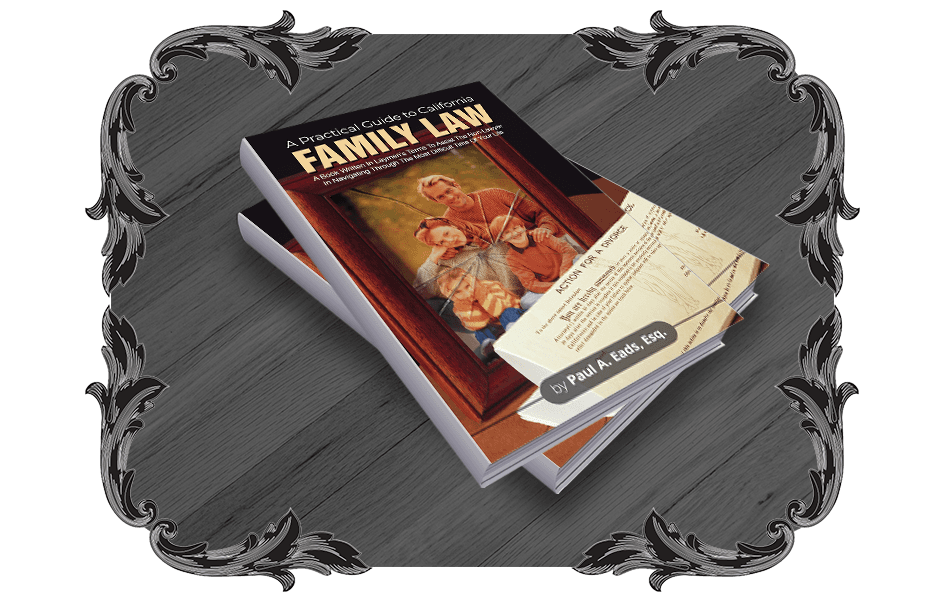
Dedicated Experience in Family Law on Your Side.
Hardships
Hardship deductions are set forth in California Family Code section 4059(e):
“Any child or spousal support actually being paid by the parent pursuant to a court order, to or for the benefit of any person who is not a subject of the order to be established by the court. In the absence of a court order, any child support actually being paid, not to exceed the amount established by the guideline, for natural or adopted children of the parent not residing in that parent's home, who are not the subject of the order to be established by the court, and of whom the parent has a duty of support. Unless the parent proves payment of the support, no deduction shall be allowed under this subdivision.”
Keep in mind that to qualify for the hardship deduction, there must either a) be an actual court order for child support for a child of another relationship that one parent is supporting or b) a new child of another relationship with actual evidence that one parent is supporting that child. If there is actual court order for child support and that parent is actually paying the child support, the court will input the amount of child support paid for the other relationship into the support calculator which effectively reduces that parent’s gross income for which they can pay child support which potentially means less child support for the current case. If the parent is not actually paying the child support for the other relationship then no credit will be forthcoming.
Another basis for a hardship deduction if covered by California Family Code section 4071 which is set forth as follows:
- "Circumstances evidencing hardship include the following:
- Extraordinary health expenses for which the parent is financially responsible, and uninsured catastrophic losses.
- The minimum basic living expenses of either parent's natural or adopted children for whom the parent has the obligation to support from other marriages or relationships who reside with the parent. The court, on its own motion or on the request of a party, may allow these income deductions as necessary to accommodate these expenses after making the deductions allowable under paragraph (1).
- The maximum hardship deduction under paragraph (2) of subdivision (a) for each child who resides with the parent may be equal to, but shall not exceed, the support allocated each child subject to the order. For purposes of calculating this deduction, the amount of support per child established by the statewide uniform guideline shall be the total amount ordered divided by the number of children and not the amount established under paragraph (8) of subdivision (b) of Section 4055.
- The Judicial Council may develop tables in accordance with this section to reflect the maximum hardship deduction, taking into consideration the parent's net disposable income before the hardship deduction, the number of children for whom the deduction is being given, and the number of children for whom the support award is being made.”
To differentiate these code sections, the latter applies to any children that either party resides with for whom they are obligated to provide support whereas the former is more applicable to child support orders that either parent is required to pay. The Court is not required to grant a party a full hardship. It is possible if another parent is involved who is also providing support for that child, that the Court may grant that parent a half of a hardship. For example, Parent A has two children with Parent B. The Parents separate. Parent B meet Parent C and they have two children together. In this situation, the Court may grant Parent B either two full hardships for the children with Parent C or they may grant one full hardship (most likely if Parent C is also working) based on the fact that Parent C is also providing support for those children. Hardships do NOT apply to step-children.
Finally, if either parent has recurring extraordinary health care costs, that parent may be granted a hardship for these recurring expenses. This provision is not intended to apply to isolated medical expenses or co-pays, but rather to extraordinary ongoing health care costs such as when a parent has to be hospitalized often.

This book, written By Paul A. Eads, helps readers know how to prepare before they initiate a legal endeavor and helps make the legal terms of family law issues easier to understand.


Client Testimonials
See What Others Are Saying
-
"Mr. Eads, you are a true master in your field and I will always be available should any of your prospective clients want to contact me as a reference."Mr. Eads, you are a true master in your field.- Peter K.
-
"Mr. Eads worked hard for me and I am confident he will do the same for you."My ex boyfriend was very abusive. His attorney seemed to be very aggressive and was always filing Ex Parte (emergency) hearings for me to appear in court. Due to a cost issue, I attempted to handle matters myself but it seemed that I could not get my point accrues to the judge who seemed to be familiar with my ex boyfriend’s attorney. I found Mr. Eads in the phonebook and I thought I would give him a call. Mr. Eads was able to get the restraining order I was seeking and my ex boyfriend ended up paying Mr. Eads’ attorney fees. I can now feel rest-assured that my daughter and I will be safe. I also happy that I do not have to deal with my ex’s attorney anymore. Mr. Eads worked hard for me and I am confident he will do the same for you.- K.Y.
-
"He was very sympathetic to my cause and was very reassuring when I needed his assistance."I was very pleased with the outcome of my case.- Albert N.
-
"I was barely able to make ends meet. Mr. Eads worked out a payment plan with me and reduced my arrears."I will be able to pay it off quicker and with more money left over with the payment Mr. Eads was able to negotiate for me.- John H.
-
"The outcome was much more than I ever expected to receive."My previous attorney failed to show up for my court date and as a result, the matter was set for trial without any input from my side. I desperately sought out an attorney but most of them wanted a huge retainer up front. I found Mr. Eads and when I went in for a consultation, I found that his retainer was more than reasonable. I also liked the fact that he practices exclusively family law and seems very familiar with the local judicial officers. I felt very comfortable with Mr. Eads in my corner going into my trial and I found that the outcome was much more than I ever expected to receive. Mr. Eads was very thorough in my case evaluation and helped me get everything I was entitled to.- J.L.
-
"Mr. Eads when to bat for me and in my opinion, hit a home run."I decided to hire Mr. Eads based on his experience and the fact that his practice is limited to Family Law.- Veronica S.
-
"Mr. Eads was able to help structure a settlement that allowed me to keep my business while sharing the business debts with my ex."I am a business owner and when I got divorced, I was terrified that I would lose my business. My business was also heavily leveraged against and I did not have enough capitol to sustain the business and pay my wife spousal support. My ex had an attorney who was very intimidating and kept pressuring me to liquidate the business so that I could pay his attorney’s fees. I was referred to Mr. Eads by a friend. Mr. Eads was able to help structure a settlement that allowed me to keep my business while sharing the business debts with my ex. I was also able to shorten my spousal support obligation. I really appreciate Mr. Eads professionalism and guidance during these difficult times.- J.A.
-
"Not only did Mr. Eads get my daughter returned to me, I was able to have full physical custody."I am honored to write this review for Mr. Eads after he helped reunify me with my daughter after my ex abducted her and moved to Arizona. I was devastated when I came home from work to find my ex had left with all our daughter’s belongings. I called the police who told me I needed to hire an attorney. I came across Mr. Eads’ website and I was impressed with his bio. I contacted him immediately and within days, we were in court requesting that my the DA Abduction unit assist me in the return of my daughter. Not only did Mr. Eads get my daughter returned to me, I was able to have full physical custody and my ex has summer and holiday visitation. Mr. Eads is truly my hero. Thanks Mr. Eads!- Paul W.